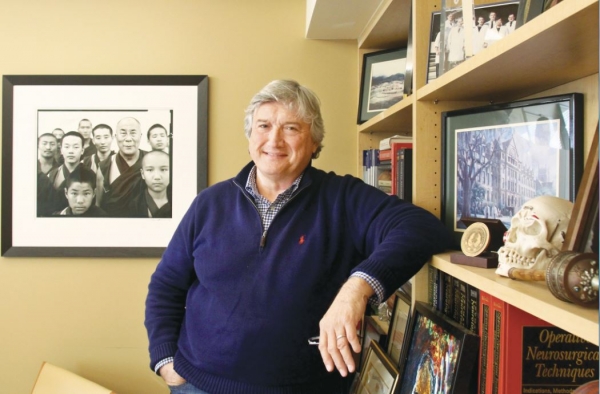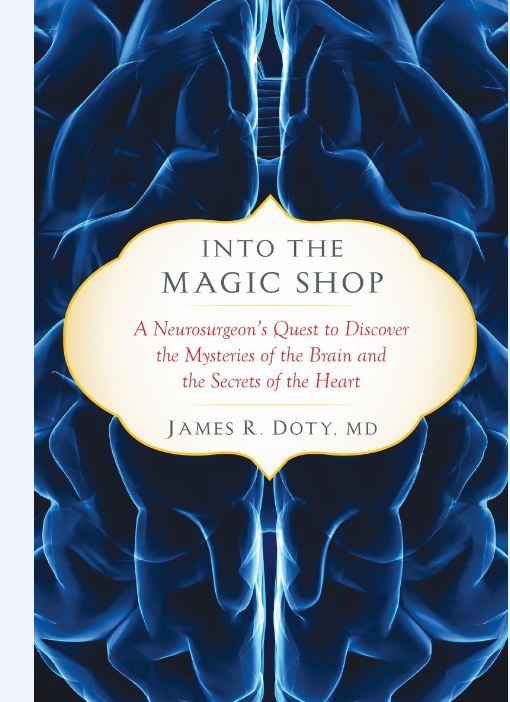Open your heart. Believe in yourself. You can have anything you want. Here's how.
The formula, so simple, sexy and seductive, has spawned an entire industry of inspiration -- some rooted in religion (Norman Vincent Peale's "Power of Positive Thinking"), some in spirituality (much of Deepak Chopra), and some in cold pragmatism (Dale Carnegie's "How to Win Friends and Influence People"). Have faith in God and all will be well, says the megachurch pastor. "How about a side of mindfulness with your bowl of empathy?" asks the modern guru. Is it really possible that all you need is love, like the Beatles once said? Or should you throw some eating and praying into the mix, like Elizabeth Gilbert?
James Doty, a professor of neurosurgery at Stanford University and director of the Center of Compassion and Altruism Research and Education, is a different sort of guide. Doty is the author of "Into the Magic Shop: A Neurosurgeon's Quest to Discover the Mysteries of the Brain and the Secrets of the Heart," a new memoir that offers a brain surgeon's take on the road to enlightenment and that has won blurbs of praise from the Dalai Lama and Glenn Beck alike. The title of the book alludes to Doty's life-changing encounter, as a 12-year-old boy, with a woman named Ruth who teaches him a different sort of magic the sort that ultimately helps him overcome obstacles and reach once-impossible goals. In his engaging book, Doty shares these lessons with the broader world and, in the process, offers insights into the effects of compassion on the human brain and the heart.
Doty grew up in Lancaster, which in his decidedly non-nostalgic recollection is a sweltering, desolate place where he could always taste dust in his mouth and where summer feels like an "endless purgatory." His immediate surroundings are hardly better. His family lives in an apartment complex surrounded by packed earth and tumbleweeds, near a barren landscape occasionally "interspersed with an abandoned car or a derelict piece of machinery." His father, an alcoholic, is constantly fighting with his mother, who suffers from chronic depression. Money is in short supply. On some nights, young James goes to bed hungry. On some days, he is fending off bullies. On others, he is consumed by anxiety about the sheriff knocking on his door to inform the family that they are getting evicted -- again. There are trips to the emergency room with his mother after another suicide attempt. There are teachers who don't think he has a chance and don't hesitate to tell him so.
His life changes when he meets Ruth at a local magic shop, while shopping for a new fake thumb. Over six weeks that summer, she teaches him how to relax his body, tame his wandering mind, visualize his goals, practice unconditional love and -- in the process -- obtain the power to "get anything I wanted." These lessons, he writes, transform his perception of himself and of the world and, over the coming decades, help him deal with domestic traumas, get into college, graduate from medical school and become a neurosurgeon, an investor and the founding director of the CCARE.
Doty's journey from a broken home to the top of his profession is far from straightforward. There are blunders, heartbreaks, financial hardships and a near-death experience along the way. But what separates his story from both the typical underdog tale and the typical self-help guide is his reflections on the human brain and heart. Unlike most spiritual gurus, Doty is an atheist. It's not pseudoscience he is pushing but neuroscience -- a subject that he navigates with the clear-eyed dexterity of an experienced brain surgeon. Ruth, in his story, does more than offer advice. She helps him "form new neural connections in my brain," he writes. And though he didn't know it at the time, his experience with Ruth was his "first experience with neuroplasticity, well before the term was commonly used."
"Today we know that the brain has great plasticity and can change, adapt and transform," Doty writes. "It is molded by experience, repetition, and intention. It is only because of the extraordinary technological advances over the last few decades that we can see the brain's ability to transform on a cellular, genetic, and even molecular level. Extraordinarily, as I learned, each of us has the ability to change the very circuitry of our brain."
It's Doty's interweaving the neurological with the personal that gives "Into the Magic Shop" its power and credibility. In another context, advice like "Open your heart" and "Believe in yourself" sounds facile -- the stuff of fortune cookies, after-school specials and Hollywood parodies (recall "Annie Hall," where Jeff Goldblum picks up the phone in the middle of a party and delivers his sole line, "I forgot my mantra."). In Doty's world, these words resonate because they are rooted in physiology. By teaching Doty to relax and focus, Ruth also incidentally trains him to regulate his vagus nerve (which connects the brain to the heart and other organs in the chest and lung area), control the pattern of his heart rhythms, create neural circuits and reduce stress levels. By teaching himself to be calmer and more compassionate, Doty the Character empowers his parasymphathic nervous system (which stimulates the rest-and-digest response) at the expense of his sympathetic nervous system (which stimulates the fight-and-flight response). This, says Doty the Physician, results in a stronger immune system, lower stress levels and lower blood pressure. By practicing the lessons from the magic shop (which can be found at intothemagicshop.com/exercises), he achieves goals that had once seemed elusive -- college, medical school, a career as a neurosurgeon and a meeting with the Dalai Lama, who in 2008 hears about Doty's research on compassion and offers him the largest donation he had ever given to any non-Tibetan cause.
The lessons also help Doty in the operating room, as we learn in the book's vivid first chapter, where we observe Doty operate on a 4-year-old boy with a brain tumor. A vein is ripped, the boy starts bleeding and is close to death. The only way to save him is to clamp a vein that Doty cannot see because it's covered in blood. Doty calms his mind. He relaxes his body. He visualizes the retracted vessel he cannot see and calmly applies the clamp.
Today, Doty writes, when he goes into an operating room he can "slow down my breathing, regulate my blood pressure, and keep my heart rate low."
"When I'm looking through a microscope and operating within the most delicate parts of the brain, my hands are steady and my body is relaxed because of what Ruth taught me in the magic shop," he writes.
Needless to say, you don't have to be a neurosurgeon or a spiritual seeker to find value in Doty's memoir. We get sad when we fall short of our goals; we get angry when a driver cuts us off on the road or when someone we love lets us down. Doty's book is a reminder that we have the power to control the negative voices in our heads. It is also a reminder that empathy and compassion can help us overcome these feelings and, like any valuable gift, enrich the lives of both the giver and the recipient.




Comments
Los Altos
on Oct 22, 2016 at 11:30 am
on Oct 22, 2016 at 11:30 am
I had the opportunity to hear Dr Doty speak about his book at Kepler's. He is an engaging speaker. I bought his book and thoroughly enjoyed it. I have since attended some wonderful presentations at the Center for Compassion and Altruism. http://ccare.stanford.edu In addition to being a surgeon, a founder and an author, Dr. Doty is also a major philanthropist. What a well-lived life!